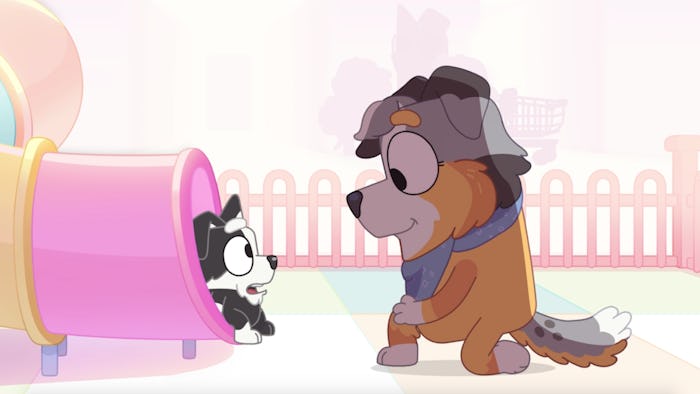Entertainment

Bluey Fans Are Confused By “Space” Episode. What Does It Mean?
This one goes deep.
As we know by now, Bluey isn’t so much a kids show but a parents show kids watch with us. Episodes can get quite cerebral and sophisticated, from “Copycat,” a Season 1 episode about how children process death to “Flat Pack,” an episode in Season 2 that parallels the life cycle to the history of evolution. But one Season 3 episode has even some adult fans scratching their heads: What is the Bluey episode “Space” really about? It’s the kind of succinct exploration of a complex topic that we expect from the beloved series.
“Space” is about Bluey’s friend Mackenzie
The episode opens with Rusty, Jack, and Mackenzie playing astronauts together. Using Glasshouse Primary School’s stationary, lawn-bound canoe as a spaceship. Rusty is the captain (naturally), Jack is the navigator (he knows the most about space), and Mackenzie is the chief scientist, whose job is to figure things out. The boys have two options: they can either head to Mars or into a black hole, which Jack explains is a hole that used to be a star before it shrunk into itself.
“What happens if you go in it?” Mackenzie asks.
“No one knows,” replies Jack, and Mackenzie begins to look serious and pensive.
Mackenzie gets “lost” throughout the game
As they prepare for their Mars mission, Mackenzie keeps finding himself untethered from the ship and lost. After accusing his friends of leaving him behind on purpose, he finally admits that he went off on purpose. “I want to pretend that you leave me behind and I’m all alone,” he confesses. He can’t explain why this is what he wants to play. He just does. When Rusty and Jack demure, Mackenzie asks if they’re sure they don’t want to go to the black hole, which has captivated him since he heard about it. It isn’t long before Mackenzie once again heads out on his own, this time into the “black hole.”
Mackenzie is transported back to a memory from his early childhood
While walking through the tunnel, the scene cuts to Mackenzie as a puppy coming through a tunnel slide in what appears to be a fenced off area of a shopping center. He coasts down, all smiles, but once he emerges, his face quickly falls.
“Mum?” he asks, looking around.
From the gentle haze of the memory comes Calypso, the school’s gentle and wise teacher.
“My mum left me behind,” he tells her sadly.
“She didn’t,” Calypso says calmly. “You just got mixed up in the slide. She’s just over there.”
On cue, Mackenzie’s mom waves to him from the other side of the very small play area and Mackenzie waves back happily.
“You know what’s here now,” Calypso tells the little pup. “You don’t have to keep coming back to this place.”
As Mackenzie makes peace with his memory, Bluey, Chloe, and Indie run up to him wearing wings, goggles and antennae, excitedly urging him to play. Just ask quickly, Rusty emerges from the other side of the tunnel to save his friend from the “aliens.”
The crew is reunited, excited, and has just enough fuel to continue on to their original mission to Mars.
What does “Space” mean exactly?
“Okay someone has to explain to me the space episode on #Bluey,” tweeted @thelifeofgabi_ after watching. “I’m legit in tears. Like Mackenzie.”
“Damn Bluey has got deep!!” exclaimed @DaveShaw25. “I had to watch this Space episode twice, still can’t fully explain it to Lucas, it’s quite sad…I think Mackenzie is suffering with a past trauma or depression!!”
Kidspot, an Australian website, was also curious and asked Ludo, the studio that makes Bluey, to explain. Their reply was somewhat cryptic...
“Each episode of Bluey is written in a way that allows the audience to make up their own mind about the details or the meaning of the storylines, allowing for many different interpretations.”
Here’s what we think...
Children process trauma through play
It’s clear that the idea of a black hole triggered Mackenzie to think about the time he went down a slide and was scared when he thought he was left behind by his mom. (Which makes sense: what is a tunnel slide to a child but a black hole you slide into.) We can see through the memory itself that he wasn’t left alone, and he wasn’t even alone for very long at all. But when you’re little it doesn’t take a whole lot to instill some big, long-lasting emotions.
Reliving these kinds of experiences through play is common in children who have experienced a traumatic or even confusing formative event. It’s a way that allows them to process and learn to cope with what happened. It’s called “post-traumatic play.” As one 2022 study explains, “a child’s post-traumatic play is ritualistic, repetitive, and often characterized by a nefarious ending. Those who practice ordinary play do so for fun and entertainment purposes, while post-traumatic play is used as a means to relieve the intense anxiety produced by the traumatic event to which the victim child was exposed and to repeat some parts of the trauma itself, with the main purpose of processing that event.”
Even though Mackenzie was never in danger or abandoned, the feeling that he was, however, brief, was clearly formative. Through play, he’s able to learn to cope with the event and his feelings. We saw a similar coping mechanism in “Copycat,” in which Bluey tries, and fails, to save an injured bird that ends up dying. She processes the death by reenacting it, often word for word, with her sister.
At the end of “Space,” Mackenzie still finds himself drawn to the black hole, but now that he’s figured out why he’s able to set it aside in his mind and focus on his “mission.”